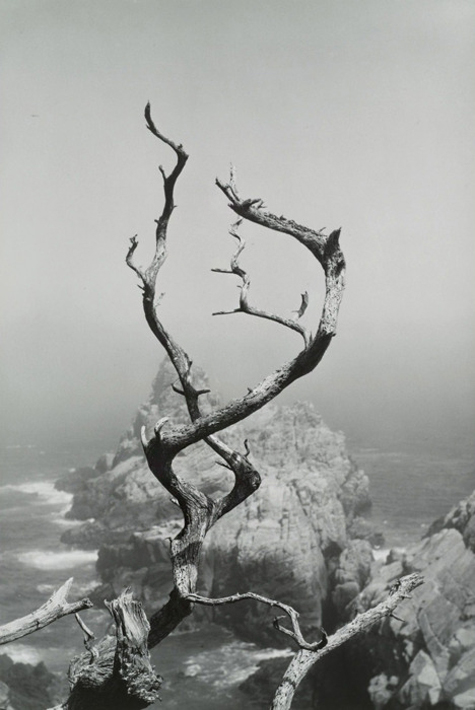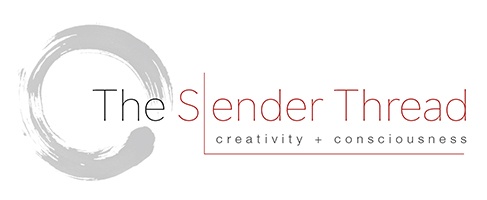
Cypress Grove Trail, Point Lobos, California, 1951 © Minor White Archive. “If I have anything to give you through camera, it must be of myself. … A gnawing burns inside … to make something of myself worth giving.” —Minor White from Mirrors Messages Manifestations
With the holidays upon us, we’ve been thinking a great deal about devotion, and what it means to give and to receive. The holidays are meant to invoke feelings of connection, peace, love, and joy. Even so, the streets and shopping centers are wretched with anxiety-ridden consumers. The act of giving has lost its significance as a symbol of love and devotion.
Giving can be an act of gratitude, a form of devotion to those who have touched us in innumerable ways. Parabola Magazine’s recent issue on Giving and Receiving contains a quote from Einstein that we would do well to remember:“A hundred times a day I remind myself that my inner and outer lives are based on the labors of other people, living and dead, and that I must exert myself in order to give in the same measure that I have received and am still receiving.”
Many become visibly undone before every Christmas and birthday, seemingly inconvenienced by what they presume to be expected to give to their loved ones. Giving, when approached like this, becomes an act centered around the giver, rather than the receiver. The receiver no longer plays a joyous role in this interaction, which becomes an obligatory act on the part of the giver.
This dynamic is all-pervasive and may be how we relate to one another and ourselves on a daily basis. Many of us understand our value and the value of others in extrinsic terms— our possessions, appearance, and achievements. Many of us view gift giving in today’s world as a way to extol our own extrinsic value. When we remove our egos from the ritual of giving, what do we have to give? And what is ours to give, but ourselves? If this holiday season, we presented others with simply our authentic being, what would that look like and how many of us would understand the significance of such an offering?
Real giving in most spiritual traditions entails the gift of devotion to a person, a path, or an ideal. David asked Matthieu Ricard, Buddhist monk, author and photographer, in a recent interview about what real devotion means:
“It is a kind of conviction, yes, a conviction that the qualities of compassion and loving-kindness can be developed, that you can know the nature of the mind, and that the luminosity that you recognize in spiritual masters can be attained. Its simply that you begin with an appreciation of what your guide, your teacher has to offer. It is a kind of respect and a keen interest. You recognize and trust in their authenticity. You recognize that they embody a kind of luminosity, a clarity, a wisdom. And that is something that you want. So it follows that you develop a yearning and an aspiration for that kind of clarity and luminosity. There is something here that you want—to put the teaching into practice yourself. … Once you put the teaching into practice and verify for yourself the effectiveness of what is taught, you develop a deep conviction to the path. That is devotion.
In Buddhism, the lineage is like a series of small candles, each one representing a person on the path. Some candles are strong, some weak and are easily blown out in the wind and so on. But the candles are lit, one to another and the flame stays alive and strong. And you know it is not any one single candle that carries the flame, but the sort of ongoing succession of them. The ultimate goal is personal transformation. The candles stay lit through the transformation of the individuals on the path. This becomes a sort of luminosity of the mind, an awareness that can be shared.” (Excerpted from Gathering Together: Interviews on Collective Intelligence, by David Ulrich )
This means that authentic love and devotion can only bloom without excessive self-interest. Genuine love, or devotion, implies service to something greater than myself: a relationship, a meaningful cause, a wisdom teaching, or a commitment to the uncovering the deepest layers of oneself. Yet that commitment can only be made from where we are now. Real love or devotion cannot yet fully be ours. We are in training to learn how to love, to give, to sacrifice. In reality, we wish to sacrifice the dominance of our lower nature in order that our higher nature—where faith, hope, and love reside—may appear. The meaning of giving can be found in this preparatory phase, where we seek to learn to love, to learn to give. We give something from ourselves and of ourselves.
I am dead because I lack desire;
I lack desire because I think I possess;
I think I possess because I do not try to give;
In trying to give, you see that you have nothing;
Seeing that you have nothing, you try to give of yourself;
Trying to give of yourself, you see that you are nothing;
Seeing you are nothing, you desire to become;
In desiring to become, you begin to live.”
—Réne Daumal, Mount Analogue
It’s important to understand what it means to be devoted and to truly give of oneself, since such understanding shines a light on our interpersonal relationships, as well as informing our political, cultural, and spiritual commitments and communities. The earth needs our devotion, as never before. Society calls on us to serve the greater good, as in our hopeful dreams of once-upon-a time. Above all, our personal relationships need our love, as it has always been and will always be.
